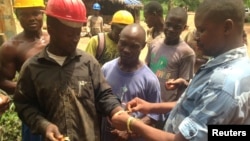The World Health Organization says there have been at least 50 new cases of Ebola in Liberia and Sierra Leone since July 3 - in what is already the worst outbreak in history. The aid group Plan International says the outbreak could become a global health crisis if there isn't a better-coordinated regional response and more support from the international community.
According to WHO, there have now been 844 cases and 518 deaths in Guinea, Liberia and Sierra Leone since the outbreak began in February.
While no new cases have been reported in Guinea in the past week, the number of suspected cases and the death toll continues to rise on an almost daily basis in Liberia and Sierra Leone.
Dr. Unni Krishnan, the head of disaster preparedness and response for Plan International, said the situation is "extremely worrying."
"This is a serious outbreak, which has serious regional dimensions now. It is not a global health crisis at this stage, but it has the risk that if we don't contain it at this stage, it is possible that it can get out of control and even reach other places," said Krishnan. "So this outbreak needs all the support from the rest of the world, so that we are able to stop its spread and save lives and help people and communities that have been impacted with this."
Prevention, containment, treatment
Plan International, along with other organizations, such as Doctors Without Borders, UNICEF and the International Federation of Red Cross and Red Crescent Societies -- has been helping local officials with containment and prevention efforts, as well as treating people and providing manpower and resources.
But Krishnan says it hasn't been enough. "You are talking about countries with some of the weakest health systems and health infrastructure. And with each passing day, the demand on agencies who have been acting on the ground has been increasing. We are stretched to our limits now.
"So this outbreak needs a much more coordinated response at the global level from developed countries and those who can afford both human resource, technical specialists and other infrastructure and machinery to contain this."
He said health officials need to improve monitoring mechanisms within affected communities, as well as at border controls and airports.
He also said more messages need to be disseminated about proper health and hygiene practices and to better educate people about how the often-fatal disease is spread by direct contact with the blood or other bodily fluids from an infected person.
Following an emergency meeting of regional health ministers in Ghana last week, the WHO announced plans to open a center in Guinea to better coordinate response efforts.
The WHO has said, however, that the outbreak is likely to continue for at least several months.




